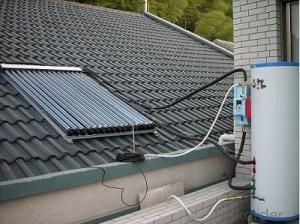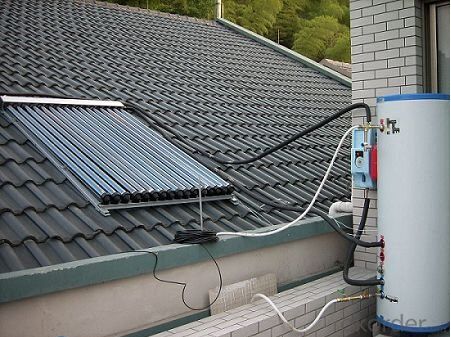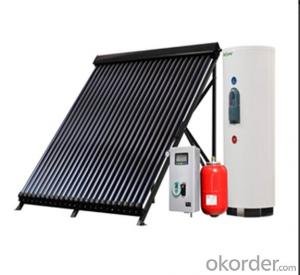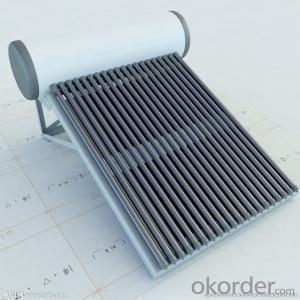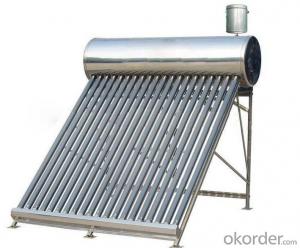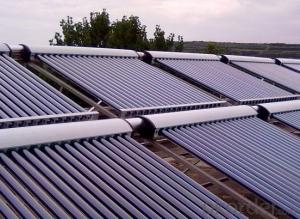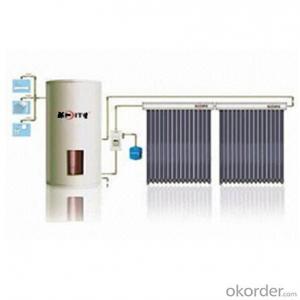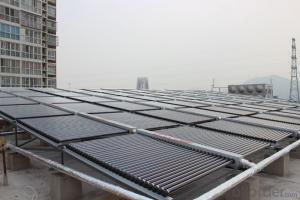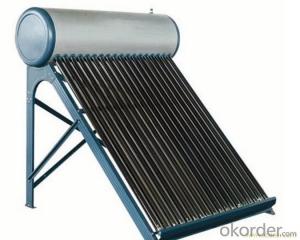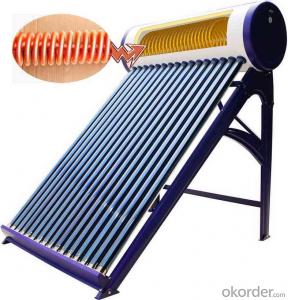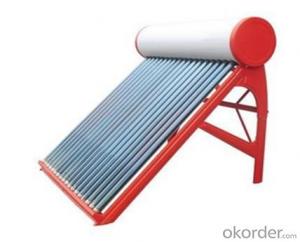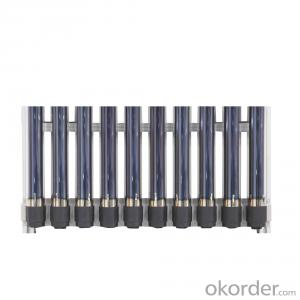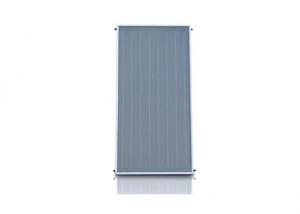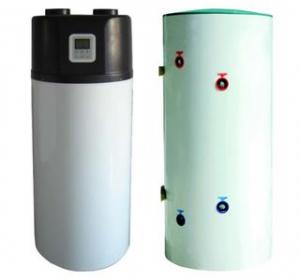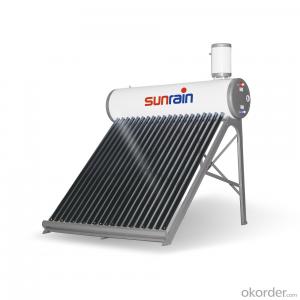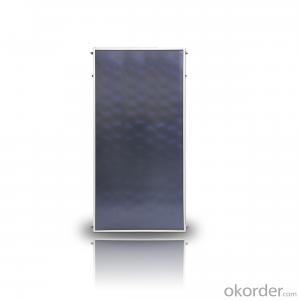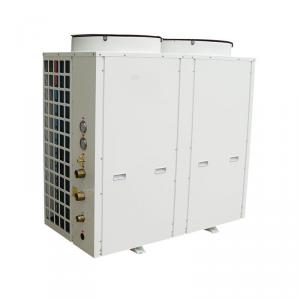Split Solar Water Heater for Pool with Two Copper Coils Inside Water Tank Model SS-M2
- Loading Port:
- Shanghai
- Payment Terms:
- TT OR LC
- Min Order Qty:
- 1 set
- Supply Capability:
- 2000 set/month
OKorder Service Pledge
OKorder Financial Service
You Might Also Like
1. Structure of Split Solar Heating System with Two Copper Coils inside Water Tank Model SS-M2
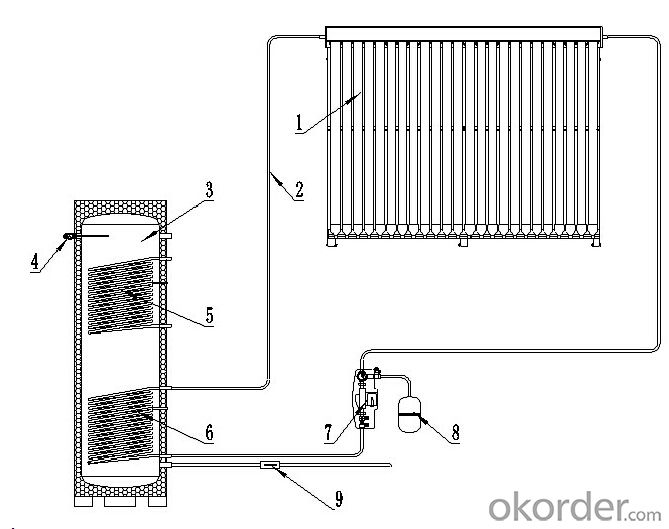
1 Flat Panel Collector;
2 Circulation Pipe;
3 Water Tank;
4 T/P Valve;
5 Upper Copper Coil;
6 Bottom Copper Coil;
7 Work Station;
8 Expansion Tank;
9 Check Valve
2. Main Features of Split Solar Heating System with Two Copper Coils inside Water Tank Model SS-M2
Food-grade stainless steel SUS304-2B inner tank
High heat transfer efficiency
Combined with auxiliary electricity, gas and other boiler
Easy installation according to the structure of the room
Integrated workstation,different Temperature cycle,make system efficient and help save energy
3. Split Solar Heating System with Two Copper Coils Inside of Water Tank Model SS-M2 Images
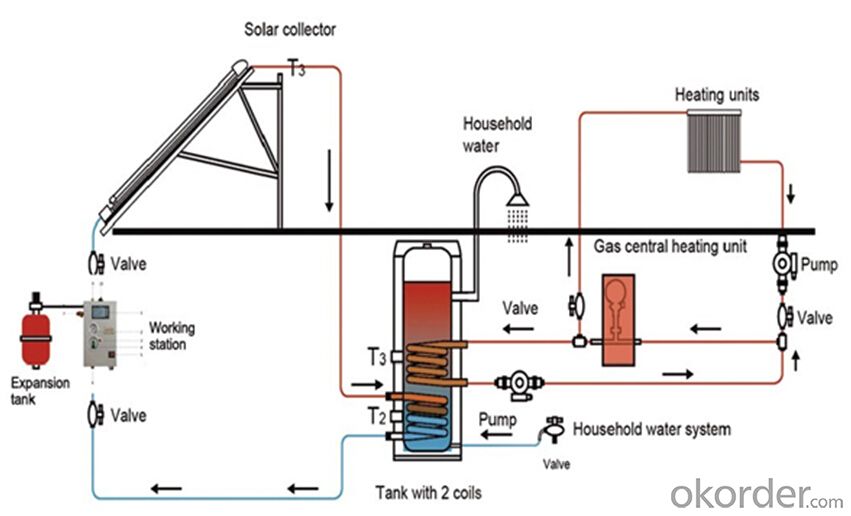
4. Split Solar Heating System with Two Copper Coils Inside Water Tank Model SS-M2 Specification
System model | SS-M2-150 | SS-M2-200 | SS-M2-250 | SS-M2-300 | SS-M2-400 | SS-M2-500 |
Tank capacity(L) | 150 | 200 | 250 | 300 | 450 | 500 |
Copper coil qty | 1/2 | 1/2 | 1/2 | 1/2 | 1/2 | 1/2 |
Solar collector model | SC-H-15/20 | SC-H-20/24 | SC-H-25/30 | SC-H-30/20 | SC-H-20/24 | SC-H-25/30 |
Solar collector qty | 1/1 | 1/1 | 1/2 | 1/2 | 2/2 | 2/2 |
Controller model | SR868C8 | SR868C8 | SR868C8 | SR868C8 | SR868C8 | SR868C8 |
Work station model | VSP-S1 | VSP-S1 | VSP-S1 | VSP-S1 | VSP-S2 | VSP-S2 |
Expansion tank spec | 12L | 12L | 18L | 18L | 24L | 24L |
Medium volume | 12L | 12L | 18L | 18L | 24L | 24L |
Recommended Flow | 1.0~2.0L/min | 1.2~2.5L/min | 1.5~3.0L/min | 3.0~5.0L/min | 4.0~7.0L/min | 5.0~8.0L/min |
Max temperature of tank | 95℃ | 95℃ | 95℃ | 95℃ | 95℃ | 95℃ |
Max temperature of system | 95℃ | 95℃ | 95℃ | 95℃ | 95℃ | 95℃ |
Rated pressure of the tank | 0.7MPa | 0.7MPa | 0.7MPa | 0.7MPa | 0.7MPa | 0.7MPa |
Media pre pressure | 0.2~0.3MPa | 0.2~0.3MPa | 0.2~0.3MPa | 0.2~0.3MPa | 0.2~0.3MPa | 0.2~0.3MPa |
Max pressure of system | 0.6MPa | 0.6MPa | 0.6MPa | 0.6MPa | 0.6MPa | 0.6MPa |
Voltage | AC220V 50Hz | AC220V 50Hz | AC220V 50Hz | AC220V 50Hz | AC220V 50Hz | AC220V 50Hz |
Recommended pipe diameter | φ15 | φ15 | φ15 | φ15 | φ22 | φ22 |
5. FAQ
Q1. Will water be heated on a cloudy day?
Re: Yes. Although the heat output of the solar collector is reduced on overcast days it will still be able to provide heat. If it is a heavily clouded day or raining, then more gas or electric boosting may be required to maintain water at the required temperature. This system will be automated so you don't have to worry about running out of hot water on a rainy day.
Q2. Can I use a solar collector with my existing hot water system?
Re: Normally yes. Simple retrofit valves can often be used to allow solar collector to connect to your existing cold water inlet. If your tank cannot accept the solar input directly, an additional storage tank can be installed to pre-heat the cold water prior to entering the existing tank.
- Q: Can a solar water heater be used in areas with limited water quality?
- Yes, a solar water heater can be used in areas with limited water quality. However, it is important to note that the water quality may affect the efficiency and lifespan of the system. Regular maintenance and periodic cleaning of the solar water heater may be required in such areas to ensure optimal performance. Additionally, the use of appropriate water treatment methods, such as filtration or purification, can help improve the water quality before it enters the solar water heater, minimizing any potential negative effects.
- Q: How does a solar water heater perform in areas with high levels of air pollution?
- A solar water heater's performance may be affected in areas with high levels of air pollution. The efficiency of the solar collector can be reduced due to the reduced sunlight reaching the system, resulting in lower water heating efficiency. Additionally, air pollution can cause the collector surface to become dirty or covered with particulate matter, further impacting its performance. Regular maintenance and cleaning may be required to ensure optimal functioning in such polluted areas.
- Q: I am in the north, the winter is coming, the family of a solar water heater, solar water heater and a radiator to connect, realizes the indoor heating, there is no one to do this kind of transformation, how to realize the water cycle?Is there any way to reduce the carbon heating in the northern region in winter?
- Solar water heater and radiator can be connected.1, solar water heater in the sun when the water temperature can reach 80 degrees, can meet the heating requirements;2, due to the instability of the solar energy, the need for auxiliary heat source, in the absence of the sun when the heating system heating;
- Q: Can a solar water heater be used in areas with high levels of soil contamination?
- Yes, a solar water heater can be used in areas with high levels of soil contamination. The solar water heater system operates independently of the soil and does not require any direct contact with the contaminated soil. The system uses the sun's energy to heat the water in a closed-loop system, which means that the water being heated does not come into contact with the soil or any contaminants present in it. Therefore, as long as the solar panels are installed in an area that receives sufficient sunlight, the level of soil contamination should not affect the functioning or efficiency of the solar water heater.
- Q: Can a solar water heater be used for heating water for agricultural purposes?
- Yes, a solar water heater can be used for heating water for agricultural purposes. Solar water heaters use sunlight to heat water, which can then be used for various applications such as irrigation, livestock drinking water, or greenhouse heating. This renewable and cost-effective technology can help meet the water heating needs of agricultural activities while reducing reliance on traditional energy sources.
- Q: Are there any health risks associated with using a solar water heater?
- No, there are no direct health risks associated with using a solar water heater. Solar water heaters are a safe and environmentally friendly alternative to traditional water heating methods, and their use does not pose any specific health hazards.
- Q: How does the size of the solar collector affect the performance of a solar water heater?
- The size of the solar collector directly impacts the performance of a solar water heater. A larger collector size allows for more surface area to absorb sunlight, resulting in a higher amount of energy being transferred to the water. This translates into increased heating capacity and faster heating times. On the other hand, a smaller collector size would have a limited surface area, leading to lower energy absorption and slower heating rates. Therefore, the size of the solar collector is a crucial factor in determining the efficiency and effectiveness of a solar water heater.
- Q: Can a solar water heater be installed by a homeowner or does it require professional installation?
- A solar water heater can be installed by a homeowner, but it is generally recommended to have professional installation. While the basic installation process of a solar water heater is not overly complex, it still involves dealing with plumbing, electrical connections, and potentially structural modifications. By having a professional install the solar water heater, you can ensure that it is done correctly and according to local building codes and regulations. Additionally, professionals have the knowledge and experience to determine the best location for installation and to make any necessary adjustments or repairs. This will ultimately result in a more efficient and effective solar water heating system. However, if you have a good understanding of plumbing and electrical work, and feel confident in your abilities, you may choose to install a solar water heater yourself. In this case, it is important to thoroughly research and follow the manufacturer's instructions, as well as consult with local authorities to ensure compliance with any necessary permits or regulations.
- Q: What are the installation requirements for a solar water heater's expansion tank?
- Depending on the specific model and manufacturer, the installation requirements for an expansion tank in a solar water heater may vary. However, there are generally accepted guidelines that should be followed. First and foremost, it is crucial to ensure easy access to the expansion tank for maintenance and inspection purposes. This can be achieved by providing sufficient clearance around the tank and ensuring that it is not obstructed by any other equipment or structures. The expansion tank should be installed on the cold water supply line, typically near the inlet of the solar water heater. This allows it to effectively absorb the increased volume of water when it expands due to heating. It is important to adhere to the manufacturer's instructions regarding the specific location and orientation of the tank. In terms of plumbing, appropriate fittings and connectors should be used to connect the expansion tank to the cold water supply line. Using high-quality, leak-proof connections is essential to prevent any water leaks. Additionally, a pressure relief valve may be required to prevent the system from becoming over-pressurized. To prevent any movement or damage, the expansion tank should be securely supported. This can be achieved by using brackets or straps to anchor the tank to a wall or another stable structure. Prior to installing the expansion tank, it is advisable to consult the manufacturer's instructions and guidelines to ensure that all specific requirements are met. It is also beneficial to seek guidance from a professional plumber or solar water heater installer to ensure that the installation is carried out correctly and in compliance with local codes and regulations.
- Q: Can a solar water heater be used with a well or borehole system?
- A well or borehole system can indeed be used in conjunction with a solar water heater. This can be a highly efficient and cost-effective option for heating water in areas where electricity may be limited or expensive. The sun's energy is utilized by the solar water heater to heat water, and this energy can be harnessed regardless of the water source. Whether the water is sourced from a well, borehole, or any other means, it can be directed into the solar water heater system to be heated by the sun's rays. This offers a sustainable and eco-friendly method for heating water for various purposes, such as bathing, washing, and even space heating. Furthermore, by incorporating a solar water heater into a well or borehole system, individuals can reduce their dependence on traditional energy sources and potentially save on energy expenses in the long term.
Send your message to us
Split Solar Water Heater for Pool with Two Copper Coils Inside Water Tank Model SS-M2
- Loading Port:
- Shanghai
- Payment Terms:
- TT OR LC
- Min Order Qty:
- 1 set
- Supply Capability:
- 2000 set/month
OKorder Service Pledge
OKorder Financial Service
Similar products
Hot products
Hot Searches
Related keywords
